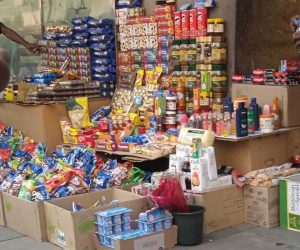
by Kovedzayi Takawira
Harare – It’s a scene of chaos and movement, with everyone eager to retreat to the places they had left in the early morning. Commuter omnibuses and pirate taxis crowd the intersection of Albion and Chinoyi Streets, rumbling loudly while touts aggressively shout “Marimba! Fio!” to lure passengers.
Amid the chaos, Mpostori continues with his business and arranges his grocery stall by the Bank Wall. He operates with a Pick-and-pay model, with no pressure, and no shouts to grab attention. His customers pick whatever they want, be it cereals, toiletries, tinned food, or drinks, and then pay him directly.
Just a street away is OK Supermarket, full of local products and most people in there are just using swipe to purchase their goods, most will just spend their gold-backed currency with an exchange rate that is not fixed to the exchange rate.
A model that Mpostori doesn’t use, all of his products are in USD but are generally cheaper compared to those from the supermarket. From time to time he takes Ecocash but it is only USD with an extra charge for the cause.
According to the OK Supermarket- Audited Abridged Financial Results and Analyst Briefing Presentation of the year 31st March 2024, Items Sold declined by 29.2 %, and this was influenced by constraints within the macro-economic environment that resulted in steep price increases and a decline in consumer spending power.
The OK group has recorded a decline in customer count since the advent of downtown tuck shops, but the game has since changed since the tuck shops are now invading their space pushing them out of business.
Brezhnev Banda a social commentator says that the recent proliferation of tuck shops should worry supermarkets.
“tuck-shops have fewer overheads as the same goods are being sold right outside at lower prices, if this is not addressed by the supermarkets themselves they are likely to see their branches shutting down”
A stone’s throw away from OK Albion is a tuck shop that also sells imported and local goods in USD getting the much-needed foreign currency from the Supermarkets,
The OK Financial statement states that the operating costs increased by 107 % during the financial year and is driven by the increase in energy costs, utilities, and property operating costs.
These factors don’t even affect Mpostori and other tuck shops surrounding the supermarket.
In the same street that OK operates in, Food World failed to maintain its business and shut down its branch, in the next street Pick n Pay also threw in the towel. Moving further downtown Choppies followed suit, not leaving out FoodWorld Jason Moyo.
During a Zimbabwe Economic Development Conference (ZEDCON) in Victoria Falls in 2023, Ministry of Finance, Permanent Secretary George Guvamatanga, labeled supermarket managers as cry babies and not innovative in their fight against tuck shops.
Chartered Financial Analyst Dr. Admire Dube agrees with Guvamatanga’s saying.
“They tend to spend cash doing the Grand Challenge and spending a lot of resources doing promotional work and ignore returns on equity”
“if your marketing program is taking 15 % of your living why continue with the same project the next year when it can’t make a return of the same 15%, barely a month you then start failing to pay your worker’s salaries but you would have distributed more than twenty cars on a promotion that never increased your retail margins or even volume of your sales throughout the year,” he said
Across Limpopo, South African Shoprite has expanded and ventured into the Spaza retail shops, with the likes of Usave and Ekasi.
Senior researcher at Trade and Industrial Policy Strategies (TIPS) Mbofholowo Tsedu says Shoprite’s decision to extend its reach into townships was not surprising given the economic conditions and market pressures on large retailers.
“Townships have always served as retail and consumer markets, [and] this strategy allows Shoprite a larger footprint with direct access to more clients,” he said.
Tsedu says placing container stores, and other “mini-shops” in the townships could be a win for both the store and its consumers. He says placing its stores closer to consumers will strengthen its supply chain with more orders from these smaller outlets.
He added that “consumers will also gain through reduced travel times, the convenience of being closer to shops and hopefully, comparably cheaper goods.
“With townships being such large population centers it can be said that there is money to be made there,” said Tsedu.
Chief Economist of Ef Consult Frank Blackmore says that the move by South African retailers ensures quality and reliability which makes them more competitive against informal spaza shops.
“one of the major benefits has probably been brand quality and reliability which has become more important recently with several accidental community poisoning incidents resulting from food bought from these shops”
Zimbabwe’s tuckshops have been on record being accused of selling counterfeit products.
“price moderation with larger retailers better ably to manage costs. The increased competition will not always benefit existing owners, but the community at large should derive benefits from this process” added Blackmore
Blackmore believes Zimbabwean retailers can adopt the spaza model, but they should at least note the difference in markets, as it could influence the evolution of the process.
“in South Africa, consumers would probably benefit from accessing known and trusted brands nearer to where they live. Other benefits could be relatively more price stability and consistency of supply depending on retailers’ involvement”
He also noted that the spaza model has a tax loophole since it mainly relies on cash transactions.
“Many aspects to consider here with SA still primarily a cash business market meaning that even though retailers may be formalized, the impact on taxes paid would be less clear”
“the same could be said about regulations, with these shops by definition located in far-flung regions of the country it would be impossible to monitor business practices or adherence to more formal rules. I would expect the same to be true in Zimbabwe” he added.
Dr Dube believes that one strategy to combat small tuckshops is to practice vertical integration, like the Simbasa brand.
“Simbisa brand has adopted a vertical integration where they purchase chickens and eggs from one of their outlet Irvins and they ensure that the supply is guaranteed with eggs and chickens”
“They own Chicken Inn and sell the end product from Irvins. Not only are they guaranteeing the tip of the spear of their business but it gets all the supply it needs and controls the price the way they want” he said
“Imagine being a retailer who can control the price of the product that gets into your shop” he added.
Boxer and Pick n Pay (S.A) have their product line in their store.













